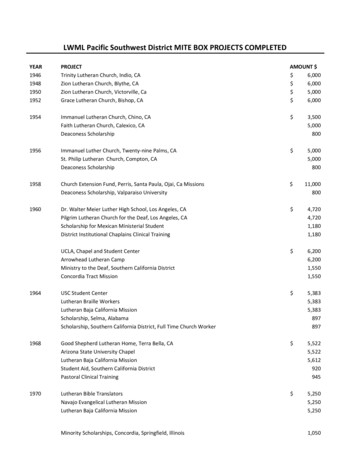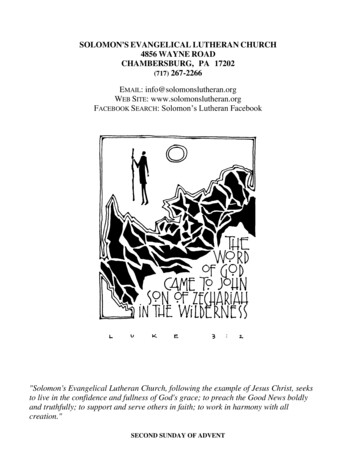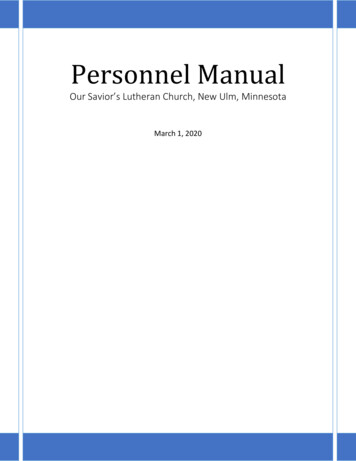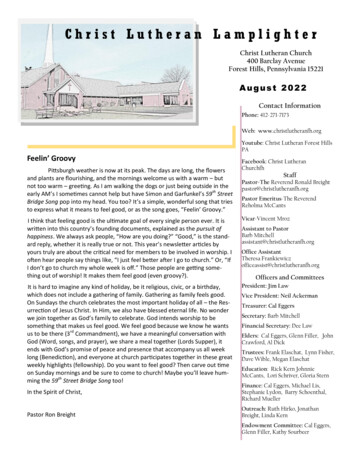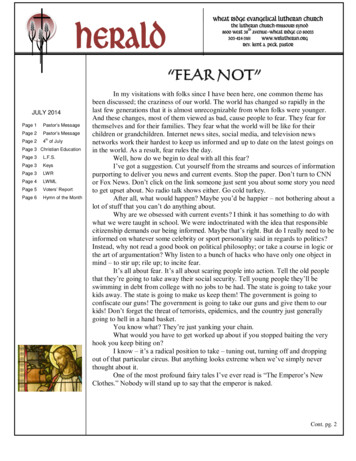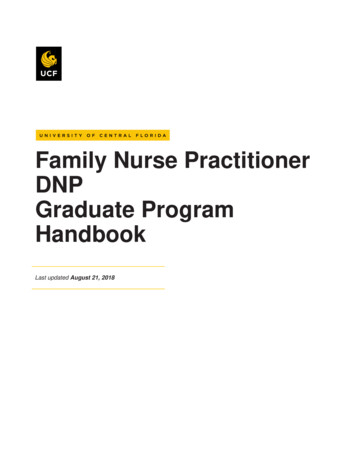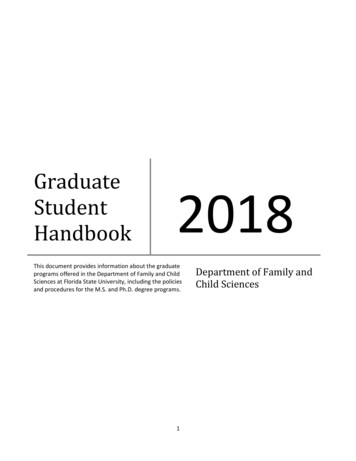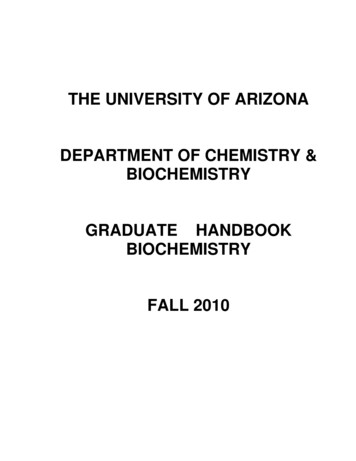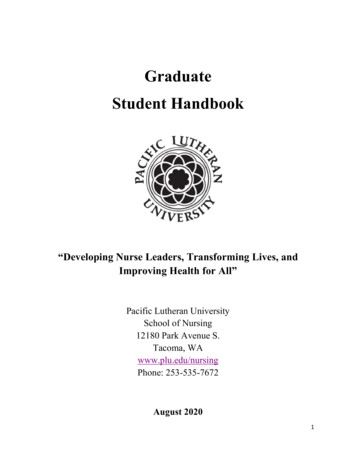
Transcription
GraduateStudent Handbook“Developing Nurse Leaders, Transforming Lives, andImproving Health for All”Pacific Lutheran UniversitySchool of Nursing12180 Park Avenue S.Tacoma, WAwww.plu.edu/nursingPhone: 253-535-7672August 20201
Table of ContentsWelcome from the Dean 8PLU School of Nursing .8University MissionSchool of Nursing Guiding PrinciplesSchool of Nursing VisionSchool of Nursing MissionSchool of Nursing MottoSchool of Nursing PhilosophyHistory of the PLU School of Nursing.11General Information .13Culture of RespectEqual Educational OpportunityPLU’s Non-Discrimination PolicyFamily Educational Rights and Privacy Act (FERPA)Interplay between PLU’s Student Code of Conduct and the School of NursingSchool of Nursing Administrative Offices .16Contact Information for SoN Administrative PersonnelSchool of Nursing OrganizationSoN Organizational ChartSoN Governance ChartCommunicationAppointments with Administration, Faculty, and StaffChange of Name, Address, or Telephone NumberElectronic ResourcesEmailSakaiBannerWebMail FoldersBulletin BoardsChanges to Student PoliciesSchool of Nursing Curriculum.20School of Nursing Conceptual FrameworkOperational definitions for conceptual frameworksMSN Conceptual Framework2
DNP Conceptual FrameworkSchool of Nursing Program OutcomesMSN Program OutcomesDNP Program OutcomesSample Programs of StudyEntry Level Master’sMSN Care and Outcomes ManagerBSN to DNP Full-time – Family Nurse PractitionerBSN to DNP Part-time – Family Nurse PractitionerBSN to DNP Full-time – Psychiatric Mental Health Nurse Practitioner (PMHNP)BSN to DNP Part-time – Psychiatric Mental Health Nurse Practitioner (PMHNP)MSN to DNP Non-ARNPPost-ARNP to DNPStudent Governance/Organizations .36Student Participation in School of Nursing GovernanceRecruitment, Admission, & Progression (RAP)Curriculum and Instruction (CIC)Program Evaluation (PEC)Student Advisory CouncilsGraduate Student Advisory CouncilStudent Open ForumsStudent Participation in Program EvaluationStudent Evaluation of Courses and FacultyEnd-of-Program Student Surveys & MeetingsStudent Participation in Faculty RecruitmentStudent Organizations and Organizations of Student InterestAssociated Students of PLUDelta Iota ChiSigma Theta Tau InternationalOrientation and Ceremonies .38School of Nursing OrientationOpening ConvocationSchool of Nursing Recognition CeremonyCommencementStudent Awards and ScholarshipsSchool of Nursing and PLU Resources .40Faculty Advisor3
School of Nursing Learning LaboratoriesUniversity ServicesAcademic AdvisingAcademic AssistanceCareer ConnectionsCommunity Service and EngagementDisability Support ServicesOn-campus EmploymentLibraryWriting CenterHelp DeskFinancial Aid and Student ServicesMilitary and Veteran’s ServicesBookstoreStudent LifeCounseling CenterStudent Health ServicesFitness ServicesWang Center for Global EducationCampus MinistryCampus SafetyDiversity Center / Women’s CenterTitle IX resourcesProfessional Conduct and Values of the Nursing Profession .44Code of EthicsValues and Professional BehaviorsIntegrity and Academic IntegritySocial Media & Electronic CommunicationNetiquetteIntimate and Sexual RelationshipsGeneral Academic Policies .48LicensingPrerequisite and Co-requisite CoursesTextbooks and Course ResourcesKaplan AssessmentPortfoliosExamsEssential QualificationsDisability Services for PLU StudentsPregnancy4
NCLEX Testing AccommodationsLetters of Recommendations and ReferencesFERPA release for Letters of Recommendations and ReferencesProfessional Misconduct and Safety Issues .87Personal working hours recommendationViolations of Academic IntegrityDisruptive BehaviorsSexual Misconduct and Non-Consenting RelationshipsDrug, Marijuana, or Alcohol MisuseDismissal from the School of Nursing for Reasons of ConductAcademic Advising.91General Advising InformationChange of AdvisorAcademic Performance .92AttendanceGrading ScaleAcademic ProgressionPerformance Progression AlertIncomplete GradesProbationary StatusRepeating a CourseDismissal from the School of Nursing for Academic ReasonsCourse Level Grade Issues .95Courses Outside the School of NursingCourse FailureGrade Dispute PolicyInformal Grade Dispute GuidelinesFormal Grade Dispute GuidelinesStatus and Enrollment .99Part-time EnrollmentLeaves from the School of NursingLeave of AbsenceMedical WithdrawalWithdrawal from the TermAbsence in Excess of One YearReturning from Leave of Absence5
Returning from LeaveReturning from Medical WithdrawalReturning from Withdrawal of the TermReturning from Leave in Excess of One YearPetitions .103The General Petition ProcessClinical Practice Policies and Health Requirements/Expectation .105Clinical PlacementCompliance and Immunization RequirementsHealth Requirement Submission DeadlinesCriminal Background ChecksUniform PolicyGrooming and AppearancePhoto IDsTransportationPrivacy Protection / Computer SecurityHealth Protection Policy/health insurance requirementsClinical Placement ComplianceIncident ReportsWashington Administrative Codes (WAC) RulesManaging Healthcare RiskJust CultureErrorsHostile EnvironmentClinical Facility Incident ReportingNeedle Stick Injury/Bloodborne Pathogen Exposure/Exposure to Communicable DiseaseProfessional RelationshipsN499 Clinical PlacementsClinical Orientation & Electronic Medical Record TrainingClinical AttendanceLiability InsuranceClinical EvaluationsAppendices .118Appendix A – Performance Progression AlertAppendix B – Statement of Understanding, Acknowledgement, and Compliance for EssentialQualificationsAppendix C – Clinical Evaluation Tool6
Appendix D – Clinical Hours CalculatorAppendix E – Incident Evaluation ToolAppendix F – Master of Science in Nursing Portfolio RubricAppendix G – Doctor of Nursing Practice Portfolio Rubric7
Welcome from the DeanWelcome to the School of Nursing at Pacific Lutheran University! I’m pleased to introduce youto one of the best School of Nursing and small liberal arts universities in the United States. Atthe PLU School of Nursing, care for our patients and for our world combine with highestprofessional ethics and commitment to academic and practice excellence, to prepare you for adeeply rewarding career in nursing. We develop nurse leaders who make a difference in the livesof their patients, the profession, and their communities. Excellence in clinical practice,professional caring, a holistic approach, and well-developed critical thinking are hallmarks ofPLU nursing graduates. In addition, graduates from the PLU School of Nursing are committed tohighest possible health outcomes through a patient-centered approach to care. Social justice,global engagement, values-based personal development, and a commitment to service arefostered through the development of strong clinical skills and professional nursing contentmastery. In addition, your education at PLU will foster your growth as a person, confident inyour ability to collaborate fully with experts in nursing and other fields, and to contributemeaningfully to health change.Our faculty experts are committed to your development as a purposeful, mature, thoughtful,highly-skilled, and highly-valued professional. You will experience excellent mentoring in acompassionate and intellectually stimulating environment, where expert practice will challengeyou to grow and succeed in nursing. Whether you are joining us for the BSN, MSN, or DNPdegree program, the relationships and foundation of learning you develop at PLU will serve youfor a lifetime and foster your contributions to a life of care. Our innovative academic andcontinuing education programs prepare nurses to meet the demands of complex healthcaresystems, community partnerships, high risk populations, and evidence-based care across thecontinuum of healthcare delivery. We are pleased to welcome you to Pacific Lutheran Universityfor your nursing education. We look forward to joining you on your journey!Barbara Habermann, PhD, RN, FAANDean and ProfessorPacific Lutheran University School of NursingUniversity MissionPacific Lutheran University (PLU) seeks to educate students for lives of thoughtful inquiry, service,leadership and care - for other people, for their communities, and for the earth.8
School of Nursing Guiding PrinciplesPacific Lutheran University School of Nursing embraces core values of:··········Benevolence, Care, and Compassion for AllNourishing Student and Faculty SuccessCelebrating Diversity and Inclusive ExcellenceFostering Whole Person DevelopmentCollaborating Intentionally as Teachers, Leaders, and Scholar-PractitionersPartnering with Communities for Improved Population Health and Well-BeingReaching out Globally for Engaged Service, Learning, and ScholarshipContributing to Sustainable Advancement of the Discipline, Profession, and Practice of NursingCultivating a Dynamic Community of Giving and LearningAdvancing Health Equity for AllSchool of Nursing VisionPacific Lutheran University School of Nursing will be a nationally recognized program of preference anddistinction, dedicated to improving health and healthcare for all, enacted through transformational nursingeducation, committed and responsive leadership, and meaningful scholarship.School of Nursing MissionPacific Lutheran University School of Nursing is dedicated to - Exemplary and responsive undergraduate, graduate, and continuing nursing education;- Engaging clinical and community partners in compassionate care for individuals, families, communities,and the world;- Fostering leadership in nursing through committed service, highest quality education, and meaningfulscholarship;– Advancing the vision and mission of the university through collaborative partnerships that fosterinnovation and change.School of Nursing Mottos- Developing Nurse Leaders, Transforming Lives and Improving Health for All.- Educating Nurses for Lives of thoughtful Inquiry, Service, Leadership, and Care.School of Nursing PhilosophyIntroductionThis philosophy describes the beliefs and perspectives of the faculty of the School of Nursing at PacificLutheran University. Student development and learning are our primary focus. The School of Nursingphilosophy embraces the vision and mission of Pacific Lutheran University for thoughtful inquiry,service, leadership, and care. We purposefully integrate liberal education with the study of nursing,9
scholarship, and civic engagement to foster compassion and meaningful service for and with others, theircommunities, and the world.Nursing and HealthThe School of Nursing believes that nursing is a theory- and science-based discipline that focuses onperson-centered care across all settings and states of health and illness. The art and science of nursing isrelationship-based and directed by humanitarian values of human dignity, interdependence, and socialjustice. As a practice discipline, Nursing works to improve the health and well-being of clients andsystems through analytical processes that effect change in the conditions and determinants of health. Thework and praxis of nursing are manifest through multiple complex and evolving roles. Nursing strives torespond to the contemporary context of health and illness, and advance shared goals of compassionate,safe, and effective care.Health encompasses the unique and dynamic unfolding of human patterning in multiple domains. Healthand illness occur simultaneously and in dynamic interaction with one another. Appreciating thecomplexity of the health-illness relationship is key to diagnosing and intervening with human experiencesof and responses to health, illness, and disease.Collegiate Nursing EducationThe PLU Nursing faculty believes collegiate nursing education contributes to shaping and stewarding theprofession and practice of nursing. Service, leadership and scholarship are essential components in theformation of mature and highest quality professional practitioners of nursing. Academic nursing advancesthe art, theory, and science of nursing by contributing to evidence-based innovations in healthcare,advocating for progressive and responsible social change, and fostering improved health outcomes.Faculty as Compassionate Leaders and ScholarsFaculty in the School of Nursing are compassionate leaders and scholars who assume responsibility forthe education and development of students into exceptional professional nurses, who embrace intellectualcuriosity, diversity, and change.Nursing faculty are dedicated to creating an open, innovative, responsive learning environment whileupholding the standards and ethical obligations of the discipline. The faculty model and instill withinstudents the active pursuit of new knowledge and pathways for contributing leadership roles for theprofession and for the discipline.The SoN faculty are integral members of the PLU community, participating in the life of the Universityand contributing to its vision, mission, and goals. Within the SoN, faculty function through team-based,collaborative approaches incorporating care, compassion, and shared goals and values. Academic rigor,principled and evidence-based inquiry, thoughtful dialogue, and meaningful evaluative reviewcharacterize the approaches used to foster highest quality nursing education, practice, service, andscholarship.10
Students as the Future Promise of the DisciplineStudents in the School of Nursing are active learners who embody the future promise and obligations ofthe discipline. Students are nurtured in their ability to provide compassionate, socially responsible careand contribute to professional citizenship in complex healthcare environments. Cross-disciplinary studentlearning is fostered through integrating the nursing curriculum with the liberal arts and sciences to fosterthe development of reflective practitioners who pursue excellence and seek to participate in the evolutionand expansion of professional roles.Shared Values and Guiding PrinciplesWe accomplish our work in the School of Nursing with attention to the vision, mission, and values of theSoN, University, and the discipline and profession of nursing. We actively pursue our development as acommunity devoted to learning and scholarship, collaborative engagement, growth, meaningful service,and love and compassion for all humankind.History of the PLU School of NursingPrior to 1950, for two decades, pre-nursing at Pacific Lutheran College (PLC) was offered in cooperationwith Tacoma General Hospital, Swedish Hospital, and the California Lutheran Hospital in Los Angeles.The first indication that a bachelor’s degree with a major in nursing existed at PLU is identified in the1945-46 PLC catalog. In the fall of 1950, the nursing curriculum was submitted for consideration by theState of Washington. On April 23, 1951, the State Board of Professional Nurse Registration gavetemporary approval for a Department of Nursing Education at Pacific Lutheran College.In September 1951, a cooperative agreement was signed between PLC and Emanuel Hospital, in Portland,Oregon, agreeing to establish a program in nursing. The clinical education would be at the EmanuelHospital and its affiliated agencies.Freda Al Peterson was the first Director from 1951 to 1953. During that time, R. Elaine Kraabel Morkenwas the Educational Director at Emanuel Hospital. When Freda Al Peterson left PLC in 1953, R. ElaineKraabel Morken became Director and served from 1953 to 1967.Ms. Kraabel Morken was followed by Dr. Doris Stucke, who served in the capacity of EducationalDirector from August 1967 until June 1982. Dr. Stucke was granted a sabbatical leave for the 1982-83academic year, following which she retired to become professor emeritus. In July 1982, Dr. MoiraMansell was appointed and served as Dean until March 1989. Dr. Dorothy Detlor-Langan served as Deanof the School of Nursing from 1989 to 1997, with Anne Hirsch serving in the role of Associate Dean,Undergraduate Nursing Education and Dr. Cleo Pass as Associate Dean, Graduate Nursing Education. In1997, Dr. Anne Hirsch assumed the role of Interim Dean for one year. In August 1998, Dr. Terry Millerassumed the role of Dean of the School of Nursing, serving until August 2014. Dr. Teri Moser Woojoined the PLU School of Nursing as Associate Dean for Graduate Programs in 2012. Dr. Sheila Smith,RN, APRN, ANP-BS, was appointed Dean and Professor in August 2014-July 2018. Dr. Carol Seavorwas appointed Interim Dean in July 2018.11
On September 17, 1958, full accreditation by the State Board of Professional Nurse Registration wasgranted. In April 1959, a consultation visit from the National Nursing Accrediting Service occurred. Anew program which would allow nursing students to remain on campus for the entire four years wasproposed, with full approval being received from the State Board of Professional Nurse Registration inJanuary 1960. In June 1960, Pacific Lutheran College became Pacific Lutheran University. TheDepartment of Nursing Education became the School of Nursing. In 1982, the title of Director waschanged to Dean.The undergraduate program encompasses three study sequences and is approved by the Washington StateNursing Care Quality Assurance Commission. The undergraduate program qualifies students for theBachelor of Science in nursing degree and certifies them eligible to sit for the registered nurse licensureexam (NCLEX-RN). The basic program is four academic years in length. A sequence for registerednurses pursuing the BSN was established in 1978. In the academic year 1997-98, the RN-BSN programbegan its phase-out. A new RN-B to MSN cohort program, for registered nurses with a non-nursingbaccalaureate, was proposed to begin September 1999. Starting in the fall of 1990, an LPN-BSN sequenceof study was initiated and implemented by Professor Shirley Coleman Aikin. This program, which allowsLPNs to obtain the baccalaureate degree following completion of prerequisites, is the first of its kind inWashington State and the Pacific Northwest.In 1989, the faculty and Board of Regents approved a proposal for a program of study leading to theMaster of Science in nursing degree. The program is four semesters in length, offered over a 2-yearperiod. The first students began classes in February 1990, with the first graduates completing the programin May and August, 1992. The MSN Care and Outcomes Manager concentration includes focus areas innurse education and administration.In 2003, the School of Nursing enrolled its first cohort in the Entry-Level MSN program. The program isdesigned for students with non-nursing baccalaureate degrees to complete the graduate degree in nursing.Students’ progress through an intensive 15-month course load which qualifies them for the NCLEX-RNlicensure examination in Washington State and progress directly into graduate coursework to completethe MSN degree. The entire sequence of courses for this generalist program requires 27 months of studyto complete.Associate Dean for Graduate Nursing Education, Dr. Teri Moser Woo joined the School of Nursing in2012 and led the faculty in developing the Doctor of Nursing Practice (DNP) program. The PLU Doctorof Nursing Practice degree prepares graduates in the advanced practice specialty area of Family NursePractitioner. The DNP is the first doctorate at Pacific Lutheran University and received initial approvalfrom the Northwest Commission on Colleges and Universities and the Washington Nursing Care QualityCommission in 2014. The first DNP students were admitted 2015.In 1981, Continuing Nursing Education became a formal program within the School of Nursing. Theinitial director was Dr. Cynthia Mahoney. In 1994, the program was incorporated into the Center forContinued Nursing Learning, and was directed by Dr. Patsy Maloney.12
A final major accomplishment of the School of Nursing was the PLU Wellness Center, which for over 23years provided low-cost health care to the community until its closure in the summer of 2009 due toshrinking public funding. A nurse practitioner faculty member, Professor Joan Stiggelbout, started theCenter in the mid-1980′s. The nurse-managed center made a major contribution to the School of Nursingand the university, as well as to the local community of Parkland.Work began on renovating the former campus bookstore in early 2020 to be transformed to the ClinicalLearning and Simulation Center. This building is located nearby on Garfield Street housing twosimulation areas, a 16 bed skill laboratory, two classrooms and student lounge areas. This building willopen in September, 2020.General InformationCulture of RespectThe PLU School of Nursing is committed to actively cultivating and promoting safe and respectfulenvironments to ensure equitable opportunities for all students, faculty and staff to learn and work tooptimal capacity. Learning environments, structures, systems, policies, and procedures will be based on apositive, productive culture of meaningful, collaborative relationships and attention to a safe, orderly, andrespectful learning and working environments.This respect is illustrated by the following behaviors: Acknowledging the value of others by treating them with respect.Exemplifying good human relations skills such as courteousness, consideration andresponsiveness to others.Acting in a dignified professional manner.Listening to others carefully and asking for clarification when necessary.Acknowledging others time frame by being on time and making reasonable requests are requisitesof respect.These behaviors reflect pride in oneself, the profession of nursing, and being a member of the PLUSchool of Nursing.The School of Nursing Culture of Respect is maintained through our Guiding Principles, expectations forstudent conduct and professional behavior, adherence to the ANA Code of Ethics for Nursing and valuesof the profession. Please refer to student policies on conduct, academic integrity, code of ethics, values,netiquette, provided throughout this Student Handbook.Equal Educational OpportunityPacific Lutheran University and the School of Nursing are committed to providing equal opportunity ineducation for all students without regard to a person’s race, color, national origin, creed, religion, age,gender, sexual orientation, mental or physical disability, or any other status protected by law. Theuniversity community will not tolerate any unlawful discrimination, harassment, or abuse of or towardany member of the university community.13
The university holds as basic the integrity and well-being of every person in the community. It iscommitted to providing an educational environment which is fair, consistent, caring, and supportive ofintellectual and personal growth. Further, it is committed to protecting the rights of its communitymembers to engage in dialog and to express ideas in an environment which is free from harassment,discrimination, and exploitation. This freedom of expression does not, however, entail the freedom tothreaten, intimidate, harass, or abuse.The university prohibits any activities which cause or threaten physical or mental harm, suffering, orexhaustion; which demean the dignity and personhood of any individual; or which interfere with one’sacademic progress. Examples of such actions are verbal threats or abuse, harassment, intimidation,stalking, threatened or actual physical assault, or consistent disregard of the rights and welfare of others.In particular, the university will see as a violation of this policy, any behavior which communicates amessage that is threatening, intimidating, or demeaning or which causes physical harm to a person orpersons because of race, color, national origin, creed, religion, age, gender marital status, sexualorientation, mental or physical disability, or any other status protected by federal, state, or local law. Anyperson or persons who are found to have violated this policy will be subject to disciplinary action up toand including suspension, expulsion, or termination.PLU’s Non-Discrimination PolicyPacific Lutheran University, in compliance with Titles VI and VII of the Civil Rights Act of 1964, TitleIX of the Educational Amendments of 1972 (45 CFR 86), and Sections 503 and 504 of the RehabilitationAct of 1973, and the Americans with Disabilities Act of 1990, does not discriminate in the administrationof any of its educational programs, admissions, scholarships, loans, or other activities or programs on thebasis of race, gender, sexual orientation or preference, national or ethnic origin, color, disability, maritalstatus, age, or religious belief.Inquiries regarding compliance with these statutes and regulations may be directed to the Office of theVice President for Student Life and Dean of Students, (253) 535-7191, PLU’s Title IX Coordinator,Jennifer Childress-White, (253) 535-7361, or to the Assistant Secretary for Civil Rights. U.S. Departmentof Education, Office for Civil Rights, Switzer Building, 330 C Street S.W., Washington, D.C. 20202.Inquiries about the School’s compliance with student access and privacy rights regarding educationalrecords, under the Family Educational Rights and Privacy Act of 1974, may be directed to the Office ofthe Vice President of Student Life and Dean of Students or to the Student and Family Educational Rightsand Privacy office, U.S. Department of Education, Washington, D.C.Family Educational Rights and Privacy Act (FERPA)The School of Nursing follows the PLU FERPA policy regarding access to educational records.According to the Family Educational Rights and Privacy Act (FERPA), all students must sign consent torelease records in order for educational materials to be placed in student mail folders, be shared withclinical agencies, or used in letters of recommendation.Mail folder release forms are distributed to all new students at orientation for educational materials(papers, etc.) to be placed in the SON student mail folders. Students who do not wish to sign a FERPA14
release for the purposes of the mail folders will need to arrange pick up of any educational materials withthe instructor. Any graded coursework or sensitive information will be placed in a sealed envelope.During new student orientation, all students must sign a FERPA Release form in order to participate inclinical practicums that allow the School of Nursing to share information with clinical agencies, includingresults of criminal background checks and drug screenings.Students often request faculty to write letters of recommendations for scholarships, residencies,employment, and graduate school. Students requesting letters of recommendation must sign consent toFERPA Reference-Recommendation Release form specifying what agencies may receive the information.Interplay between PLU’s Student Code of Conduct and the School of NursingEach student associated with PLU, including each student in the School of Nursing, is expected to befamiliar with and to follow all policies, rules and regulations promulgated by the university, as well aslocal, state and federal laws. Students are expected to know and follow conduct standards set out in thePLU Student Code of Conduct. Failure to abide by the policies, rules, and regulations may result indisciplinary action(s) outlined in the Student Code of Conduct, up to and including suspension orexpulsion from the university.Nursing programs, by their nature as healthcare professional programs, hold students to higher standardsof academic, professional, and behavioral expectations than the general university, so students at theSchool of Nursing are also expected to know and follow the additional standards specific to the School ofNursing. Those standards are identified throughout this handbook, and are summarized in this policy.PLU nursing students are required to abide by all policies and standards of the School of Nursing as aminimum expectation for admission, standard program progressions, and for program completion. Thereare possible conduct-based circumstances where a student would be eligible to continue his or hereducation at PLU, but not to continue in the School of Nursing. Readmission to PLU after suspension, forexample, does not equate to readmission to return to the School of Nursing, and should not be consideredas such. In some
BSN to DNP Full-time - Family Nurse Practitioner . BSN to DNP Part-time - Family Nurse Practitioner . BSN to DNP Full-time - Psychiatric Mental Health Nurse Practitioner (PMHNP) BSN to DNP Part-time - Psychiatric Mental Health Nurse Practitioner (PMHNP) MSN to DNP Non-ARNP . Post-ARNP to DNP . Student Governance/Organizations .36 . Student Participation in School of Nursing .
